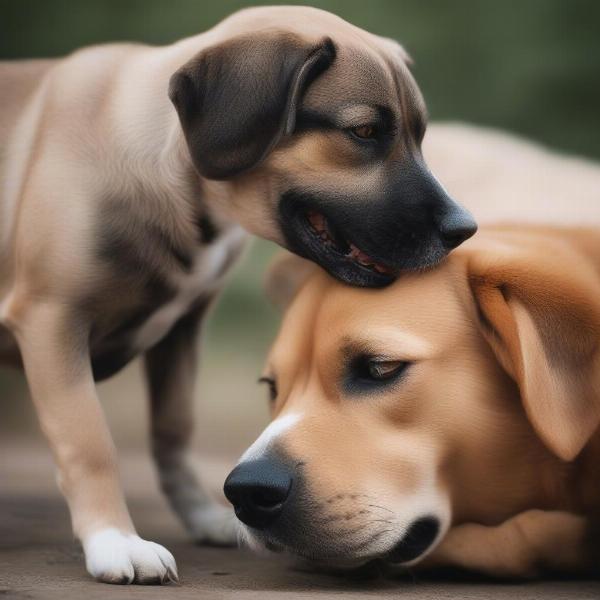If you’ve noticed one of your dogs obsessively chewing on another dog’s ears, you’re likely concerned and wondering why. This behavior can range from gentle nibbling to intense gnawing, and understanding the root cause is crucial to addressing it. This article will explore the various reasons behind this behavior, from simple playfulness to underlying medical or behavioral issues, and offer solutions to help you restore peace in your multi-dog household.
Possible Reasons for Ear Chewing
Several factors can contribute to a dog chewing another dog’s ears. Pinpointing the exact cause can require careful observation and, in some cases, professional advice.
Play and Social Interaction
Sometimes, ear chewing can be a part of normal dog play, especially between puppies or young dogs. It can be a way of initiating play or showing affection, similar to how dogs might playfully mouth each other’s necks. However, even if playful, this behavior should be monitored to ensure it doesn’t become excessive or aggressive.
Teething Puppies
Puppies experiencing the discomfort of teething may chew on anything within reach, including their canine companions’ ears. This chewing provides relief from the pain and pressure of emerging teeth.
Dominance and Bullying
In some cases, ear chewing can be a sign of dominance or bullying behavior. A dominant dog might chew on a subordinate dog’s ears to assert their position within the pack hierarchy. This behavior is often accompanied by other dominant displays, such as pinning, staring, or resource guarding.
Medical Issues
Underlying medical conditions, such as ear infections, allergies, or parasites, can cause itching and discomfort, prompting a dog to chew on another dog’s ears. The affected dog might also scratch their own ears excessively. If you suspect a medical issue, it’s essential to consult a veterinarian.
Anxiety and Boredom
Dogs experiencing anxiety or boredom might engage in compulsive behaviors, including ear chewing. This can be a way for them to self-soothe or release pent-up energy.
Addressing the Behavior
Once you’ve identified the potential cause of the ear chewing, you can take steps to address it.
Redirect the Behavior
If the chewing appears to be playful, redirect your dog’s attention to appropriate chew toys. Provide a variety of engaging toys to keep them occupied and prevent them from fixating on their housemate’s ears.
Manage Teething Pain
For teething puppies, offer chilled teething toys or frozen treats to soothe their gums.
Address Dominance Issues
If dominance is suspected, consult a certified professional dog trainer or behaviorist. They can help you implement strategies to establish clear boundaries and a healthy pack dynamic.
Seek Veterinary Care
If you suspect a medical issue, schedule a veterinary appointment for a thorough examination and diagnosis. Treatment for underlying conditions can alleviate the discomfort that triggers the chewing.
Enrichment and Exercise
Provide ample opportunities for physical exercise and mental stimulation to prevent boredom and anxiety. Regular walks, playtime, and interactive toys can help channel your dog’s energy and reduce the likelihood of compulsive behaviors.
 Dog Chewing Another Dog's Ears Due to a Medical Issue
Dog Chewing Another Dog's Ears Due to a Medical Issue
Creating a Harmonious Multi-Dog Household
Maintaining a peaceful environment for multiple dogs requires understanding their individual needs and dynamics. Careful observation, consistent training, and proactive management can help prevent and address unwanted behaviors like ear chewing.
“Ear chewing can be a sign of several different issues, and it’s important to address it promptly. Ignoring the behavior can lead to escalated conflicts and potential injuries,” says renowned canine behaviorist, Dr. Emily Carter.
Conclusion
Understanding why your dog chews your other dog’s ears is the first step toward resolving the issue. By addressing the underlying cause, whether it’s playful interaction, teething discomfort, or a medical condition, you can create a more harmonious and comfortable living environment for all your canine companions. Remember to consult with a veterinarian or professional dog trainer for persistent or concerning behavior.
FAQ
-
Is ear chewing always a sign of aggression? No, ear chewing can be part of normal play, especially among younger dogs. However, it’s important to monitor the behavior and ensure it doesn’t become excessive or aggressive.
-
What should I do if my dog’s ear chewing is causing injuries? Consult a veterinarian immediately to address any injuries and determine the underlying cause of the behavior.
-
How can I tell if the chewing is playful or dominant? Playful chewing is usually gentle and reciprocal, while dominant chewing is often more forceful and accompanied by other dominant behaviors.
-
Can ear chewing be a sign of an allergic reaction? Yes, allergies can cause itching and discomfort, leading to ear chewing. Consult a veterinarian to rule out any allergies.
-
What are some appropriate chew toys for my dog? Choose durable chew toys made of non-toxic materials that are appropriate for your dog’s size and chewing habits.
-
How can I prevent ear chewing in the future? Provide ample exercise, mental stimulation, and appropriate chew toys. Address any underlying medical or behavioral issues promptly.
-
When should I consult a professional dog trainer? If you are struggling to manage the behavior or suspect dominance issues, consult a certified professional dog trainer or behaviorist.
ILM Dog is your trusted resource for all things dog-related. We offer expert advice on dog breeds, health, training, nutrition, grooming, and much more. From choosing the right breed to addressing behavioral issues, ILM Dog provides valuable information to help you be the best pet parent possible. Contact us for personalized support and guidance: Email: [email protected], Phone: +44 20-3965-8624. Visit us at ILM Dog for more helpful tips and resources.